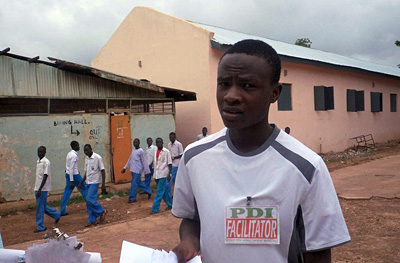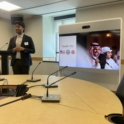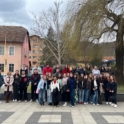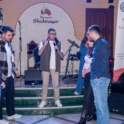Abdulaziz reflects on the highlights from serving as a mentor for CEW.
STORIES
“Reverse Culture Shock”: Returning Home After Study Abroad

Above: TJ does community service in Sokoto, Nigeria
When considering study abroad, most people assume the greatest challenge will be adjusting to the new culture and environment of the place they will be visiting. However, in some cases, it’s the return home that brings the biggest challenge.
 Tijjani Attahir was one of 60 high school students from Nigeria and Tanzania who studied in the U.S. through the Youth Exchange and Study (YES) Program during the 2009-2010 school year. Since returning to Sokoto, Nigeria, in June of 2010, TJ has recognized some of the challenges students face in adjusting to life at home.
Tijjani Attahir was one of 60 high school students from Nigeria and Tanzania who studied in the U.S. through the Youth Exchange and Study (YES) Program during the 2009-2010 school year. Since returning to Sokoto, Nigeria, in June of 2010, TJ has recognized some of the challenges students face in adjusting to life at home.
That’s not to say, though, that that there weren’t adjustments to living in Iowa.
“I drank hot water on the tap before I was told that there are separate knobs for different outcomes,” TJ said. “And I sought reasons why American football is called ‘football’ rather than ‘aggressive hand ball.’”
Before studying in the U.S., TJ had a clear understanding of where he lived: “An environment where more is given, less is gained. An environment where I see electricity only for a few hours a day and where clean tap water is available for only a couple of hours in the morning.”
He said the U.S. provided an entirely different lifestyle, where because there is plenty available, people are able to have clear minds to “exercise talents, good attitudes and get excellent grades in school.”
Reactions vary from sadness to empowerment
TJ explained that it is easy for students studying abroad to become fearful and anxious about returning home, especially when the environments differ so greatly from one place to another.
After becoming accustomed to the amenities of life in the U.S., the stress of returning to less or merely “different” can be difficult both physically and psychologically. This is sometimes called “reverse culture shock.”
TJ thinks there are three ways that most students handle this challenge.
“After the program, some YES students will feel sadness – always thinking about how they can return to the States. Their thoughts are bent toward that ‘one fun time’ enjoyed while in the U.S., and they forget to share with their people the culture and all they learned while in the program.”
Some students can return home with different views of their own people. “They become arrogant and feel like they are steps ahead of their people having returned from the ‘Mighty United States.’”
However, he believes these outcomes only happen to students who are “unwise” from the beginning.
In TJ’s case, and in the case of most other YES students, there is a third outcome.
“They use the opportunities they had and the experiences they gained while in the program to share with their people,” he said. “They use the methods of learning and teaching that they experienced to teach their relatives, friends and neighbors.”
The YES Program is specifically designed to lead to this third outcome by emphasizing leadership and community service as part of the program requirements. IRIS also encourages students to develop and implement “alumni projects” after returning home.
One example is Ummul-Khair Ango Aliyu, whose project involves sewing and distributing clothes for orphans in her community.
Positive effects of study abroad last a lifetime
TJ believes his experiences in the YES Program will help shape his future career and life as a whole.
“The leadership skills I developed and the ‘thankful’ behavior I built is helping make my life easier at home,” he said. “As a high school graduate who wishes to study in an advanced science/technology college, I believe this experience will help me achieve my goals in postsecondary education and will make my society proud.”
Ultimately, TJ believes that the key to a smooth adjustment is keeping a positive attitude.
“To me, home is home whatever, however, whenever, wherever.”





